Abstract
Russia is the largest owner of oil and gas deposits and a supplier of petroleum products. To obtain marketable products, oil is delivered to refineries, which are a complex organism for extracting oil products from supplied raw materials. The 2019-nCoV novel coronavirus epidemic, which erupted in December 2019, has become a major economic and social event in 2020. At the same time, the oil market turned out to be one of the main victims. The level of economic security of enterprises is one of the factors influencing the economy of the state, as well as the level of its financial and economic security. The article considered economic security as a factor in increasing the efficiency of the oil refining enterprises. In the work, the analysis of the economic security system and the management system at the oil refining enterprise was carried out. As a result of the analysis, we came to the conclusion that the system of motivation for management personnel needs to be improved taking into account new approaches and management trends. It is necessary to introduce a KPI system to motivate management personnel. The result of the implementation of a system of performance indicators is a system for assessing the effectiveness of the entire process. A properly working system provides management with the necessary information, which, at the right time, allows making decisions in a timely manner, identifying factors influencing the achievement of goals and making adjustments to the action plan.
Keywords: Economic securityeconomic security serviceintegral indicatormotivation of management personneloil refining
Introduction
In recent years, a positive trend has emerged in the development of the Russian oil refining industry. At oil refineries, construction and commissioning of new complexes for deep oil refining is underway, and the quality of produced motor fuels is improving. The volume of oil refining in 2019 decreased by 2 million tons. compared to 2018. This is one of the highest values in recent decades. The maximum oil refining was observed in 2014 in the amount of 295 million tons. The dynamics of oil refining volumes is shown in Figure
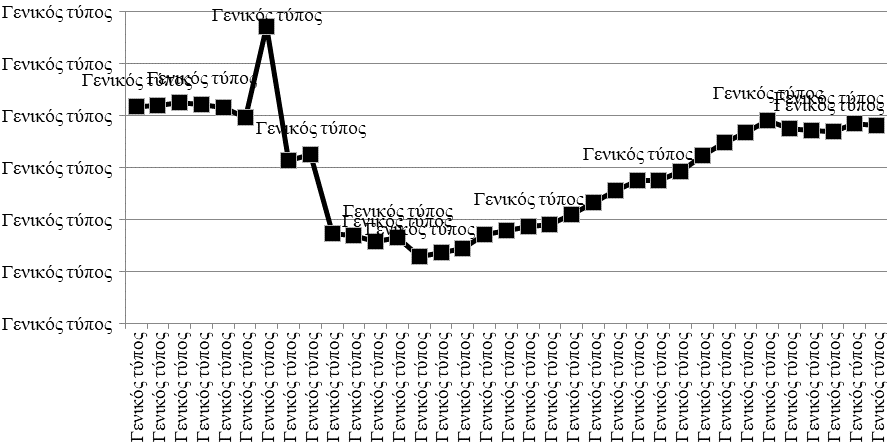
Studying the dynamics of the production of main petroleum products in Russia since 1985, shown in Figure
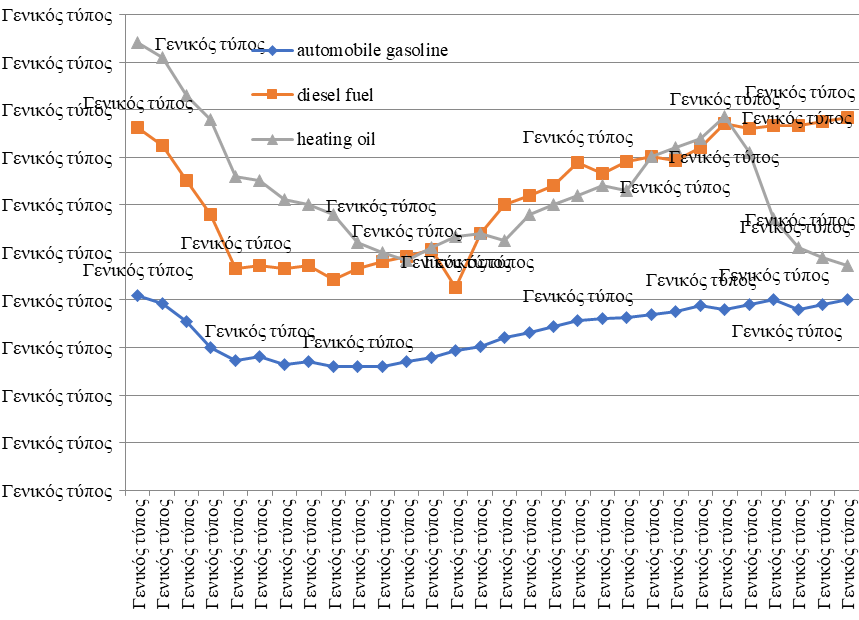
Favorable exogenous factors (macroeconomic, political and technical) have largely supported the growth of Russian oil and gas stocks in 2019, and this trend is expected to continue - mainly due to positive changes in the sector in the near term. The dynamics of quotations of individual securities will "follow the dividends" of specific companies, and Gazprom Neft and Tatneft will benefit more from this trend. Rating agencies raise their recommendation for Tatneft shares - ordinary (new target price for 12 months - USD 15.30) and preferred (USD 14.20), as well as for Gazprom Neft (USD 9.00).
Russia is the largest owner of oil and gas deposits and a supplier of petroleum products. To obtain marketable products, oil is delivered to refineries. Refineries are a complex organism for extracting oil products from supplied raw materials. The number of refineries in Russia has not changed in recent years, at least the major giants are still in operation, but some refineries have changed their owners. Having erupted in December 2019 in the Chinese province of Hubei, under still unclear circumstances, the 2019-nCoV novel coronavirus epidemic has become the main economic and social event of the first months of the new year.
The oil market turned out to be one of the main victims - for the first five weeks in 2020, oil prices were incessantly falling, marking the most negative trend since November 2018, pushing oil-producing countries and the OPEC+ cartel to a significant correction of the previous rate. In 2020, the main threat to the Russian economy is a reduction in oil exports to China and a decline in oil prices. In March 2020, the price of a barrel of Brent crude fell below $ 49 for the first time in 2.5 years. The oil sector may lose $ 15-18 billion - mainly in the first half of the year, analysts of TsMAKP warn. Thus, the coronavirus has become one of the main problems of the global economy, made investors seriously nervous and led to the collapse of stock indices. Oil is getting cheaper, the ruble is falling.
Problem Statement
PJSC NK Rosneft is the largest oil company on the list of the country's strategic enterprises. Its predecessor, Rosneftegaz, was formed in 1991 to replace the USSR Ministry of Oil and Gas Industry. In 1993, it was transformed into the state enterprise Rosneft, which in 1995 acquired the status of a joint stock company. Rosneftegaz is part of it, this is the shareholder who owns the controlling stake.
In the early 2000s, the board of the company set the following goals:
- tightening control over assets;
- debt reduction;
- registration of licenses for the implementation of projects in Siberia.
The organization received assistance from the Government, which allowed it to increase its role in the national economy. In 2002, Krasnodarneftegaz joined Rosneft, and in 2003, Severnaya Neft was acquired. In early 2009, Russia represented by Rosneft and China represented by CNPC signed several supply contracts for a 20-year period, as well as the construction of a new branch of the Eastern Oil Pipeline towards China. PJSC NK Rosneft is the largest enterprise for the extraction and processing of "black gold".
Today the company occupies a leading position not only in the country, but also in the world. Rosneft produces 40% of all Russian oil and 6% of world oil. The company owns 13 refineries in Russia, and 5 abroad (Germany, India and Belarus).
Rosneft's retail network is the largest in Russia, with around 3,000 filling stations. The state share in Rosneft accounts for more than 50% of the authorized capital. The shareholders include domestic and foreign giant companies.
The controlling stake belongs to the state organization Rosneftegaz. Main directions of activity:
1. Geological exploration of hydrocarbon deposits.
2. Extraction of hydrocarbons.
3. Processing and sale of raw materials.
PJSC NK Rosneft is actively increasing gas production, developing this business segment. In 2018, the company reported the highest production level for the year among all independent gas producers in Russia.
Research Questions
The Centralized Accounting Department (subordinate to the Chief Accountant) and the Department of Economic Security (subordinate to the Deputy General Director for Economic Affairs) are directly responsible for economic security in Rosneft.
The main tasks of the department of economic security are:
1. Control over all transactions made by the plant with counterparties in order to prevent deliberate or knowingly unfavorable terms of transactions for the plant.
2. Control over the movement of goods and materials, the expenditure of material and monetary funds.
3. Conducting an analysis in the field of economic activity of the enterprise in order to reduce costs, increase the profitability of the economic activity of the enterprise.
4. Timely bringing to the attention of the head of the enterprise the results of the checks carried out in the form of written reports, memoranda.
5. Development of proposals for the management of the enterprise aimed at improving the efficiency of financial and economic activities.
Functions of the Economic Security Department:
- checking the validity of the prices specified in the contracts (letters) for the purchased goods and materials, as well as for services rendered to the enterprise by third-party organizations (according to estimates or calculations);
- control reconciliation of prices with suppliers of products for compliance with their payment documents;
- selective control over the timely receipt of paid material assets;
- identification of facts of misuse of material assets, selective control over the supply of materials;
- a comprehensive analysis of the financial and economic activities of the enterprise and others.
At the enterprise, accounting and analytical work is carried out by the centralized accounting department, which is subordinate to the chief accountant.
The centralized accounting department of PJSC NK Rosneft is an independent structural unit of the cooperative and reports directly to the General Director. The accounting department is headed by the chief accountant appointed by the order of the General Director of PJSC NK Rosneft.
Thus, the organizational structure of the type of delegation of authority in Rosneft, the management structure is linear. This structure is characterized by the transfer of tasks and powers from the manager to subordinates, and then to other subordinates, and so on, and at the same time the levels of management are formed.
Purpose of the Study
The purpose of the final qualification work is to assess the economic security of an oil refining enterprise, as well as to develop recommendations for increasing the level of economic security of the enterprise. The subject of the research is the system of ensuring economic security and management systems at the oil refining enterprise. In the context of a pandemic and a constantly changing economic environment, the issues of ensuring the economic security of enterprises are very relevant and many scientists are researching these issues: Belskaya and Dronov (2019), Godina et al. (2019), Ivanova, (2017), Karanina and Mamurkov (2019), Kutukova (2019), Nusinov and Mishchuk (2019), Shynkar et al. (2020), Vasina et al. (2017).
Research Methods
To analyze the current level of motivation of Rosneft's management personnel, a survey was conducted. 100% of management personnel were interviewed - 73,630 people. The technology for analyzing the motivation of management personnel involves going through several stages, which include:
Preparation for conducting a survey of management personnel.
Conducting a survey of management personnel.
Final operations.
Monitoring of the conducted survey of management personnel.
Preparation includes making a decision on the need to conduct a survey, defining goals and objectives, agreeing on the timing and timing of the survey, choosing a target audience, appointing responsible persons, and forecasting expected results. At the second stage, the questionnaire itself was carried out. The employees were divided into groups and they were presented with the developed questionnaires, the questions of which had to be answered. At the final stage, the questionnaires were processed by the responsible persons, conclusions were drawn, and the main measures were developed to increase staff motivation. In turn, at the monitoring stage, a conclusion was made about the effectiveness of the developed measures. So, let's consider the results of the survey. Figure
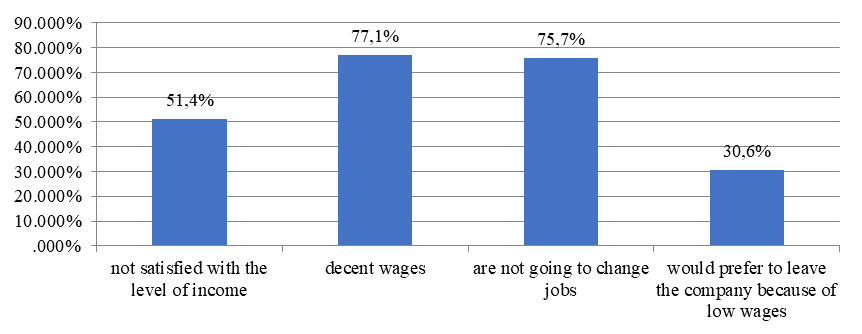
The results of a survey of Rosneft employees showed that 51.40% of employees are not satisfied with the level of income in the organization and decent wages are a determining factor for 77.1% of workers. Despite this, 75.7% of the company's employees are not going to change jobs in the near future. Nevertheless, if they had to change jobs, 30.6% of respondents would prefer to leave the company because of low wages (Figure
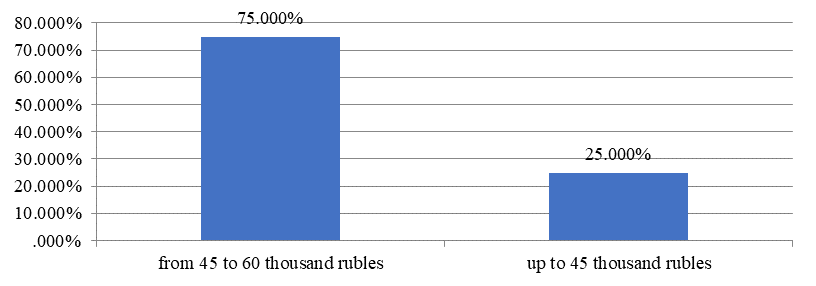
The overwhelming majority of respondents, 75%, have an income of 45 to 60 thousand rubles; 25% have income up to 45 thousand rubles. The majority of employees - 92.40% - indicated that salaries at Rosneft are the main source of their income (Figure
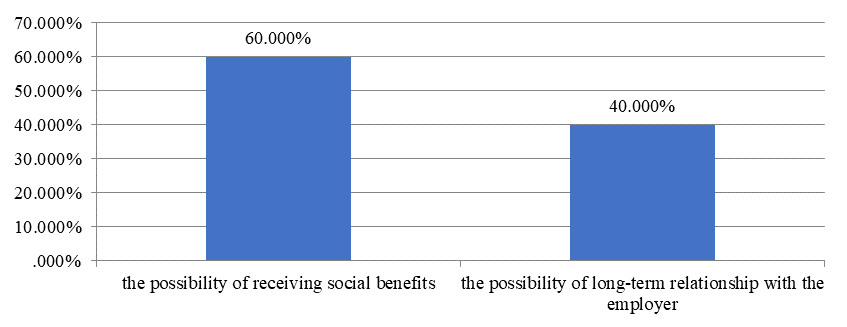
In second and third places, the most important factors were named "the possibility of receiving social benefits" (40%) and "the possibility of long-term relationship with the employer" (30%). With regard to career opportunities, the survey employees determined that the concept of employee career is primarily associated with an increase in well-being (the largest number of responses), career development, and a sense of confidence and stability (in second and third places in the number of responses). Also, in one of the questions, it was proposed to distribute the factors of motivation that were most significant for them at the moment, or in which areas they would like to see changes in the future. Some of the most common criteria for choosing a company have been added to the list. There were 5 factors to choose from. The results obtained, the most important motivation factors for employees, can be presented in the form of a diagram (Figure
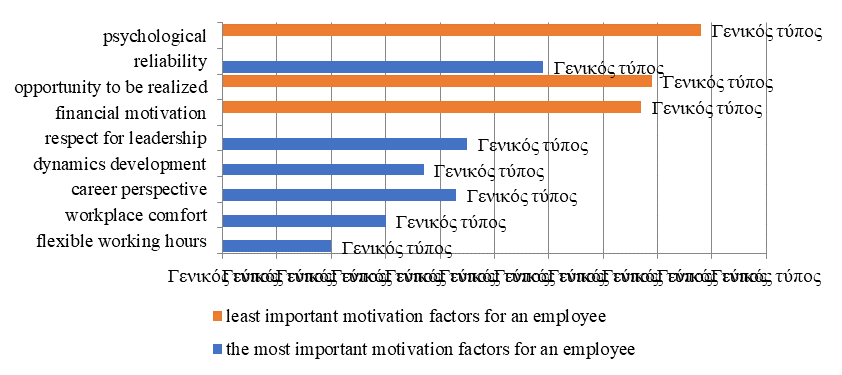
As you can see, the factor "psychological atmosphere, team" was chosen by an overwhelming majority of votes - 88%. “Company reliability, stability” is important for 58% of respondents. “The ability to realize their skills and knowledge” and “Financial motivation” are important for 77.1%. "Respect for leadership" 46%, "development of the company's dynamics" 35%, "competitiveness of the company" 30%, "the prospect of a career to move up the career ladder" 42%, "comfort of the workplace in general" 34.5%. 20% of employees would like to have a flexible work schedule. The least important factor was considered “closeness of work to home” at 10%. 73.4% of employees believe that motivation can be most developed. Let us summarize the obtained results of assessing the motivation of Rosneft's management personnel in the summary Figure
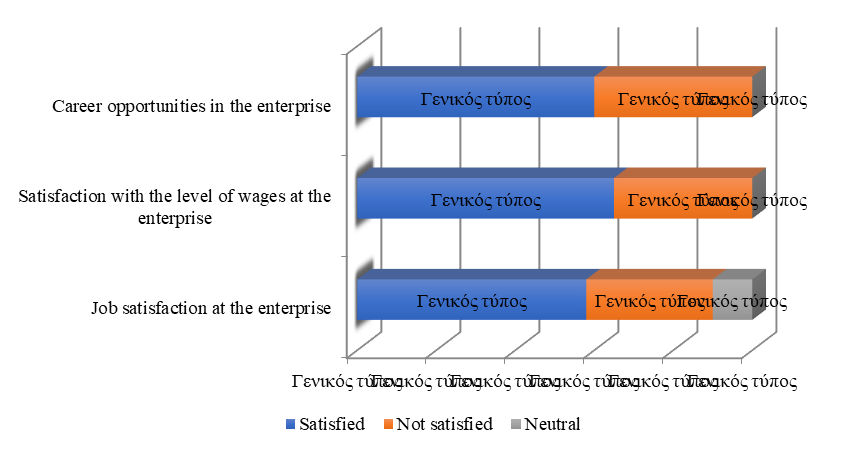
The results of assessing the motivation of Rosneft's managerial personnel show that 58% or 42,705 people are generally satisfied with their work in the organization. Not satisfied with the work in the organization - 32% - this is 23562 people. 65% (47859 people) are generally satisfied with the level of wages in the organization and 35% (25771 people) are not satisfied. 60% (44,178 people) of respondents see opportunities for career growth in PJSC NK Rosneft, and 40% (29,452 people) do not see opportunities for career growth in PJSC NK Rosneft. Based on the study of the system of incentives for the management personnel of Rosneft, it can be concluded that the system of incentives for the management personnel needs to be improved taking into account new approaches and management trends.
Findings
Calculation of the effectiveness of the implementation of the KPI system to motivate management personnel. It is based on the use of motivation coefficients, which will have a direct impact on the amount of the employee's bonus, calculated for the period, taking into account the results of his activities. The scale of the motivation coefficient should be fixed in the position on bonus payments. Let's present an example of calculations using Excel (Table
Let us present an example of filling in the matrix for a specialist of PJSC NK Rosneft in Table
It should be noted that the competent use of the KPI system in the enterprise will serve as a good motivator both for an individual employee and for the entire team as a whole.
Conclusion
The introduction of KPIs at Rosneft Oil Company will increase productivity by 15%. Next, we will determine the forecasted value of labor productivity, which will amount to 0.032 billion rubles. per 1 employee (0.028 billion rubles * 115/100). For the calculation, we take the value of labor productivity in 2019 (8676 billion rubles / 304,500 people = 0.028 billion rubles). Let's determine the forecast value of revenue in 2020: 0.032 * 304,500 people. = 9744 billion rubles. For the calculation, let us take the forecasted values of labor productivity in 2020 in the amount of 0.032 billion rubles. and the number of personnel in the amount of 304,500 people.
Let's calculate the effect of the event implementation:
E = R – Z (1)
where R - results (increase in revenue); Z - the cost of services for the implementation of the KPI system at large enterprises is 25 billion rubles.
Carrying out calculations using this formula, we determine the effect of the implementation of these measures, which will amount to 9719 billion rubles. Thus, the event is effective. Statistics confirm that as a result of the introduction of the KPI system at Rosneft, the lack of initiative and indifference of employees decreased by 57%, productivity increased by 15%, and with it by 19% - operating income and 28% - gross margin. Next, we will consider the level of economic security before and after the implementation of measures in PJSC NK Rosneft (Table
Thus, analyzing Table
References
- Belskaya, E., & Dronov, E. (2019). Features of financial security management at the enterprise. Bulletin of the Tula State University. Economic and Legal Sciences, 10, 9-15.
- Federal State Statistics Service (2020). Information on the socio-economic situation in Russia. https://rosstat.gov.ru/compendium/document/50800
- Godina, O. V., Kosenkova, Y. Y., Maksimenko, L. S., Mezentseva, Y. R., & Shcherbakova, T. A. (2019). Strategic directions of innovational development of socio-economic systems. In E. Popkova & V. Ostrovskaya (Eds.), Perspectives on the Use of New Information and Communication Technology (ICT) in the Modern Economy. Advances in Intelligent Systems and Computing, 726 (pp. 118-127). Springer.
- Ivanova, L. K. (2017). Economic security of the enterprise. Bulletin of the Ufa State Aviation Technical University, 7, 30-33.
- Karanina, E. V., & Mamurkov, I. V. (2019). Assessment of indicators of economic security of economic subjects: Regional and industrial aspects. Issues of Risk Analysis, 16(1), 24-41.
- Kutukova, E. S. (2019). Economic security in the prism of modern economic processes. Rusays.
- Nusinov, V. Yа., & Mishchuk, I. V. (2019). Use of speed indicators in assessing and ensuring economic security of enterprises. Economies’ Horizons, 1(8), 14-24.
- Shynkar, S., Gontar, Z., Dubyna, M., Nasypaiko, D., & Fleychuk, M. (2020). Assessment of economic security of enterprises: Theoretical and methodological aspects. Business: Theory and Practice, 21(1), 261-271.
- Vasina, N. V., Danilov, A. N., Kalnitskaya, I. V., & Nedelko, G. V. (2017). The method of calculating the threshold values of the performance indicators of organizations of industries of the economy. The Science of Man: Humanitarian Research, 3(29), 183-189.
Copyright information

This work is licensed under a Creative Commons Attribution-NonCommercial-NoDerivatives 4.0 International License.
About this article
Publication Date
30 April 2021
Article Doi
eBook ISBN
978-1-80296-105-8
Publisher
European Publisher
Volume
106
Print ISBN (optional)
-
Edition Number
1st Edition
Pages
1-1875
Subjects
Socio-economic development, digital economy, management, public administration
Cite this article as:
Tarasova, T. M. (2021). Assessment Of The Level Of Ensuring Economic Security At Oil Refineries. In S. I. Ashmarina, V. V. Mantulenko, M. I. Inozemtsev, & E. L. Sidorenko (Eds.), Global Challenges and Prospects of The Modern Economic Development, vol 106. European Proceedings of Social and Behavioural Sciences (pp. 471-481). European Publisher. https://doi.org/10.15405/epsbs.2021.04.02.57

